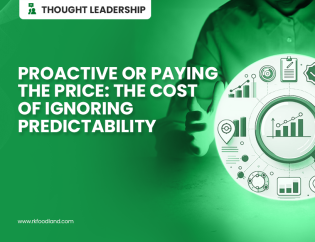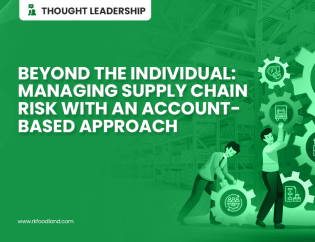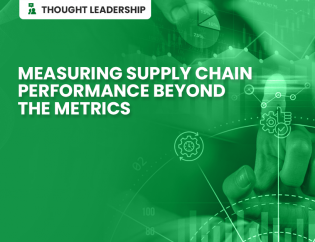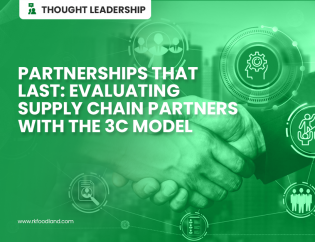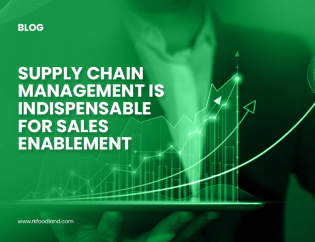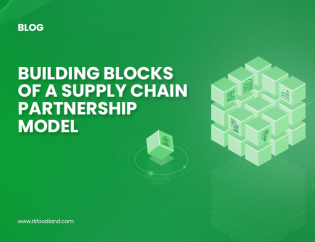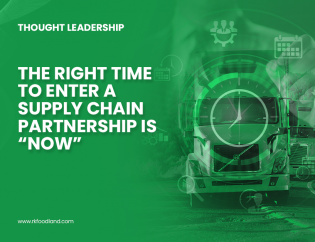
The Indian food industry has grown exponentially over the past two decades and is expected to grow at an 8% CAGR. The food ecosystem is evolving and what was once supply-driven and linear, is now demand-driven and undergoing transformation. These changes have been accelerated by improved infrastructure, better connectivity, rise in incomes and more recently, the pandemic. Businesses have realised the need to be more resilient and adaptable in this BANI (Brittle, Anxious, Non-linear, and Incomprehensive) world. To adapt to these demand dynamics, businesses need supply chains that are flexible, agile and resilient. This can be best achieved by forging supply chain partnerships that help brands manoeuvre the variability, bring in responsiveness and stability in these circumstances.
Consumption landscape is becoming more complex and demanding
Changing consumer habits, convenience and demographics, now drive demand, access and delivery. In this demand-driven food ecosystem consumers are at the centre of every development; product taste, packaging and distribution, are designed with consumers’ convenience in mind. Awareness regarding the significance of a healthy lifestyle has risen demand for naturally sourced food options. Once considered a niche concept, plant-based diets have gained massive momentum due to their nutrition quotient and long-term positive impact on the environment. Also, there is a set of audiences whose reliance on ready-to-eat food is increasing due to the changing work habits in Indian households. To cater to these dynamic consumer preferences & demands, and meet their expectations, brands have to develop capabilities and capacities. Supply chain partnerships enable businesses to capture consumer data and relay it across the ecosystem in the form of actionable insights to deliver enhanced customer experience through integrated planning and fulfilment.
Supply Chains need to reorient for newer business models
With disruptions in business models, newer channels like cloud kitchens, food aggregators, D2C and away from home and others, have evolved as brands explore deeper into geographies to boost consumer interactions and respond to their needs. Thus, the traditional single channel approach has now evolved into modern omnichannel value chains and businesses need end-to-end visibility for better transparency, predictability and traceability in their ecosystem. With multi-source supply, numerous SKUs and widely spread consumption centres, businesses need capabilities for accurate planning mindful sourcing, optimised inventories, well-managed warehousing and on-time fulfilment, which is only possible with an end-to-end integrated supply chain. In their study, Ohio State University found that a strategic partnership allowed Wendy’s and Tyson’s teams to work closely together for new product development and establish higher levels of assurance. Supply chain partnerships enable businesses to re-imagine, re-define and re-configure the entire value chain to align it with their growth plan. It also allows partners to leverage capacities and capabilities, share risks and rewards and focus more on core competencies.
Future-relevance can be assured only by embracing sustainable practices
As the demand dynamics and customer preferences have evolved, so has the businesses’ outlook toward sustainability. Businesses are equally mindful of their ESG initiatives, as they invest in tracking their impacts and are taking actions to conduct business responsibly. Partner preferences too are getting stringent as businesses look to reduce their carbon footprint in their quest to achieve a carbon-neutral value chain. A fair and equitable work environment with diversity & inclusion in teams, a sense of responsibility towards the community through local sourcing & employment, mindful investments towards developing a safe place for people to work, and commitment towards ethical business practices & compliance to the law of the land are some key points that businesses need to look for in their partner. Supply chain partnerships help businesses better align their vision towards a balanced ESG stance and develop positive synergies through green supply chains, social responsibility and business governance. Such partnerships create long-term value & future relevance.
Drawing on the recent observations of Gartner in its “Hype Cycle for Supply Chain Strategy, 2022”, ‘Ecosystem Partnerships’ as a concept is gradually gaining importance. As supply chain resilience has reached the peak of inflated expectations, businesses are expanding their reach horizontally for more visibility and risk mitigation. ‘Ecosystem Partnerships’ in the next 3 to 5 years will be an integral part of every supply chain strategy. For businesses who wish to reap the benefits of future-ready supply chains, the time is now for them to identify, assess and engage with the right partner. Through a strategic long-term supply chain partnership, food brands can be better equipped to handle disruptions, enhance supply chain performance, improve profitability and enable sustainable growth.
We at RK Foodland believe that we all are a part of an ecosystem driven by a common purpose to achieve supply chain outcomes that drive positive transformations for a better tomorrow. To make this happen, supply chain partnerships have a very crucial role to play.
We look forward to co-creating a future ready value chain. Let’s discuss >>
